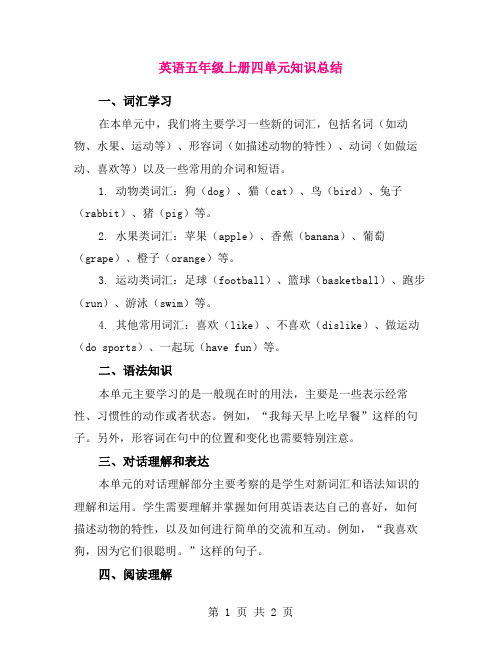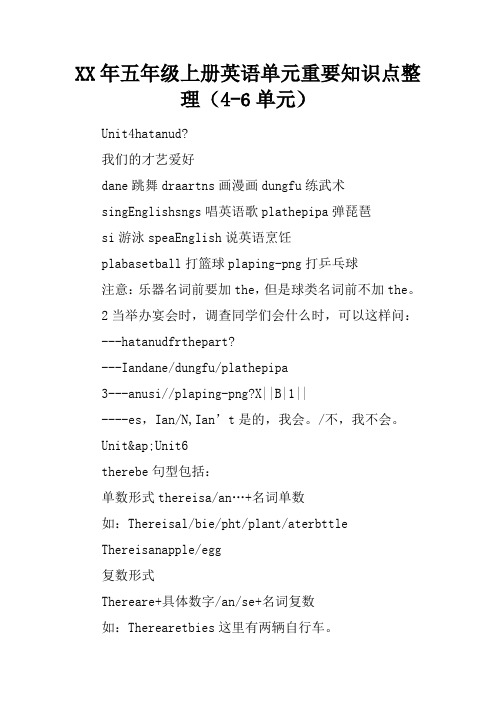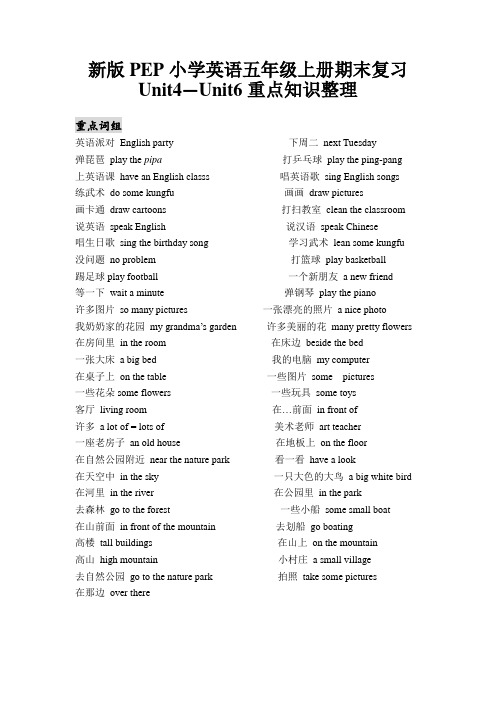2017年五年级上册英语单元重要知识点整理(4-6单元)
- 格式:doc
- 大小:25.50 KB
- 文档页数:4

五年级上册英语重要辅导资料(4-6单元)人教版五年级上册英语重要辅导资料(4-6单元)人教版U4 复习巩固一请默写出下列单词和短语唱歌歌曲跳舞画画卡通烹饪游泳打篮球打乒乓球讲英语画漫画练武术弹琵琶唱英歌二请完成下列句子9、A: ? (根据答句写出问句)B:es, I an d se ung fuA: ? (根据答句写出问句)B:I an seep the flr三语法重点1、当你想询问别人会干什么时,用hat an u d? /当你想知道他人会干什么时,可用hat an he d ? 或者hat an she d ? (注:其中an为情态动词,后面必须用动词原形。
)2、I an …变为一般疑问句:an u …?肯定回答是否定回答是U 复习巩固一请默写出下列单词和短语时钟植物瓶子自行车照片正面两者之间在上面在前面在旁边在后面二请完成下列句子10、A: ? (根据答句写出问句)B: There is a big bed in the rA:(房间里有一些花吗?)B:es,11、A: the trash bin?(垃圾桶在哪里?)B:It’s the table(在桌子的附近。
)三语法重点There be 句型:它一般表示在某地有某物。
There be 句型包括单数形式的There is a/an …句型和复数形式的there are …句型。
There is a/an …句型表示有一个,后面跟名词单数。
如There is a irrr n the all。
There are …句型表示有多个,后面一般接具体数字或se , an,再后面跟名词复数,如There are t end tables near the bed。
2、There be 句型中使用单数句式还是复数句式遵循就近原则。
(1)有一个讲台和许多桌在教室里。
There a teaher’s des and an dess inthe r(2) 有许多桌和一个讲台在教室里。

英语五年级上册四单元知识总结一、词汇学习在本单元中,我们将主要学习一些新的词汇,包括名词(如动物、水果、运动等)、形容词(如描述动物的特性)、动词(如做运动、喜欢等)以及一些常用的介词和短语。
1. 动物类词汇:狗(dog)、猫(cat)、鸟(bird)、兔子(rabbit)、猪(pig)等。
2. 水果类词汇:苹果(apple)、香蕉(banana)、葡萄(grape)、橙子(orange)等。
3. 运动类词汇:足球(football)、篮球(basketball)、跑步(run)、游泳(swim)等。
4. 其他常用词汇:喜欢(like)、不喜欢(dislike)、做运动(do sports)、一起玩(have fun)等。
二、语法知识本单元主要学习的是一般现在时的用法,主要是一些表示经常性、习惯性的动作或者状态。
例如,“我每天早上吃早餐”这样的句子。
另外,形容词在句中的位置和变化也需要特别注意。
三、对话理解和表达本单元的对话理解部分主要考察的是学生对新词汇和语法知识的理解和运用。
学生需要理解并掌握如何用英语表达自己的喜好,如何描述动物的特性,以及如何进行简单的交流和互动。
例如,“我喜欢狗,因为它们很聪明。
”这样的句子。
四、阅读理解阅读理解部分主要考察学生对本单元主题相关的文章的理解和解读能力。
学生需要理解文章的主题,理解文章中的新词汇和语法知识,并根据文章内容回答问题。
五、练习与提高学生可以通过做一些相关的练习题来提高自己的英语水平,包括词汇练习、语法练习、对话练习和阅读理解练习等。
这些练习题可以帮助你更好地理解和掌握本单元的知识点。
六、文化常识在学习本单元的过程中,学生还可以了解一些相关的文化背景知识,如不同国家的风俗习惯、文化传统等,这有助于更好地理解和运用英语。
总之,英语五年级上册四单元的学习内容涵盖了词汇、语法、对话理解和表达、阅读理解等多个方面。
学生需要全面掌握这些知识,并通过不断的练习和实践来提高自己的英语水平。

XX年五年级上册英语单元重要知识点整理(4-6单元)Unit4hatanud?我们的才艺爱好dane跳舞draartns画漫画dungfu练武术singEnglishsngs唱英语歌plathepipa弹琵琶si游泳speaEnglish说英语烹饪plabasetball打篮球plaping-png打乒乓球注意:乐器名词前要加the,但是球类名词前不加the。
2当举办宴会时,调查同学们会什么时,可以这样问:---hatanudfrthepart?---Iandane/dungfu/plathepipa3---anusi//plaping-png?X||B|1||----es,Ian/N,Ian’t是的,我会。
/不,我不会。
Unit≈Unit6therebe句型包括:单数形式thereisa/an…+名词单数如:Thereisal/bie/pht/plant/aterbttleThereisanapple/egg复数形式Thereare+具体数字/an/se+名词复数如:Therearetbies这里有两辆自行车。
Therearesebuildings这里有一些建筑。
Thereareantrees这里有许多树。
2当询问他人这里有什么吗时,只需要把Thereis…变成Isthere…?Thereare…变成Arethere?如:Thereisariver/hill/frest/lae/untainIsthereariver/hill/frest/lae/untain?肯定回答:es,thereis否定回答:N,thereisn’tTherearefurbridges/villagesAretherefurbridges/villages?肯定回答:es,thereare否定回答:N,therearen’t3当问球在哪里时,应该问:---hereistheball?---It’sinbeside/behind/abve/infrntfthedgUnit≈Unit6therebe句型包括:单数形式thereisa/an…+名词单数如:Thereisal/bie/pht/plant/aterbttleThereisanapple/egg复数形式Thereare+具体数字/an/se+名词复数如:Therearetbies这里有两辆自行车。

新版PEP小学英语五年级上册期末复习Unit4—Unit6重点知识整理重点词组英语派对English party 下周二next Tuesday弹琵琶play the pipa 打乒乓球play the ping-pang 上英语课have an English classs 唱英语歌sing English songs练武术do some kungfu 画画draw pictures画卡通draw cartoons 打扫教室clean the classroom 说英语speak English 说汉语speak Chinese唱生日歌sing the birthday song 学习武术lean some kungfu 没问题no problem 打篮球play basketball踢足球play football 一个新朋友 a new friend等一下wait a minute 弹钢琴play the piano许多图片so many pictures 一张漂亮的照片 a nice photo我奶奶家的花园my grandma’s garden 许多美丽的花many pretty flowers 在房间里in the room 在床边beside the bed一张大床a big bed 我的电脑my computer在桌子上on the table 一些图片some pictures一些花朵some flowers 一些玩具some toys客厅living room 在…前面in front of许多a lot of = lots of 美术老师art teacher一座老房子an old house 在地板上on the floor在自然公园附近near the nature park 看一看have a look在天空中in the sky 一只大色的大鸟 a big white bird 在河里in the river 在公园里in the park去森林go to the forest 一些小船some small boat在山前面in front of the mountain 去划船go boating高楼tall buildings 在山上on the mountain高山high mountain 小村庄 a small village去自然公园go to the nature park 拍照take some pictures在那边over there重点句型1. We’ll have an English party next Tuesday.我们将要有一个英语派对。

人教PEP版五年级上册英语1-6单元重点知识梳理(全册)Unit 1 What he like?一.重点单词(能听,说,读,写的单词)old年老的 young年轻的 funny 滑稽的 kind和蔼的strict 严格的polite 礼貌的helpful乐于助人的shy害羞的hard-working勤奋的 clever聪明的二.三会单词(会听,说,读的单词)shy 害羞的sometimes有时will 将要know 知道robot 机器人 finish 完成she’s =she is 她是he‵s=he is 他是who‵s=who is谁是what’s =what is 什么是Mr.先生 Miss 小姐 Ms女士三.语音(能分辨清Yy 的发音)发音y /i/ baby宝宝happy开心的candy糖果windy刮风的sunny晴朗的sorry 对不起/ai/ shy sky try fly cry my/j/ yellow yo-yo yes young yard三.重点句型:(深黑色字体的要求会听,说,读,写)1、A: Ms Wang will be our new Chinese teacher.王女士使我们新语文老师A: What’s she like?她怎么样?B: She’s very kind? 她很和蔼A: Is she strict? 她严格吗?B: Yes,sometimes. 是的,有时候.2、A: Do you know Mr Young?你认识杨先生吗?B: No,I don’t (否定回答)不,不认识。
Yes,I do(肯定回答)是的,我认识。
3、A: Who is your math teacher? 谁是你的数学老师?B: Mr Li李先生。
4、A: Is she strict? 她严格吗?B: Yes,she is.(肯定回答)是的,她严格。
No,she is not.(否定回答),不严格。

五年级英语上册第四单元的必背知识点一、核心词汇1. 动词sing:唱;唱歌dance:跳舞draw:画cook:烹调;烹饪swim:游泳2. 名词song:歌曲kung fu:功夫;武术cartoon:漫画party:聚会;派对problem:问题email:电子邮件3. 短语sing English songs:唱英文歌曲play the pi pa:弹琵琶do kung fu:练武术draw cartoons:画漫画play basketball:打篮球play ping-pong:打乒乓球speak English:说英语二、了解词汇1. 动词learn:学;学习;学会want:要;想要send:邮寄;发送2. 其他we’ll = we will:我们将要next:下一个的;紧接着的;接下来的any:任何的,任一的wonderful:极好的;了不起的no problem:没问题三、核心句型1. We’ll have an English party next Tuesday!解读:这是一般将来时的句子,表示下星期二我们将举行一个英语联欢会。
we’ll = we will,will表示将来,后加动词原形。
2. What can you do for the party, children?解读:这是询问他人能做什么的句型。
for作介词,意思是“为;给”。
3. I can sing English songs.解读:此句型常用来表示某人具备某种能力,can意思是“能;会”,后加动词原形。
4. Can you do any kung fu, John?解读:此句型用来询问某人是否会做某事,是一般疑问句,用“yes/no”来回答。
四、了解句型1. Let’s play together!解读:这是一个祈使句,let’s = let us意思是 “让我们”,后加动词原形。
2. I have an English class at 3 o’clock.解读:这是一个描述时间安排的句子,可以举一反三应用到其他科目和时间的描述上,如“have a maths class上数学课”,“have an art class上美术课”,“have a Chinese class上语文课”。
英语五年级上册第四单元知识点英语五年级上册第四单元知识点在平时的学习中,大家都背过不少知识点,肯定对知识点非常熟悉吧!知识点就是“让别人看完能理解”或者“通过练习我能掌握”的内容。
相信很多人都在为知识点发愁,下面是小编为大家收集的英语五年级上册第四单元知识点,仅供参考,大家一起来看看吧。
英语五年级上册第四单元知识点篇1cook theme als [kuk][][mi:l] 煮饭watertheflo wers [‘w:t][][‘flau] 浇花swee pthef loor [swi:p][][fl:] 扫地cleanthebedroom [kli:n][][‘bedrum] 打扫卧室maketheb ed [meik][][bed] 铺床setthetable [set][][‘teibl] 摆饭桌washt h eclothes 洗碗碟dothedishe s 收拾衣服useacomputer 使用计算机What canyo udo? 你可以做什么?Icansweepth efloor. 我会扫地。
Icancookthemeals. 我会做饭。
Icanwa terthe flowers! 我会浇花!Canyoumaketh ebed? 你会铺床吗?No,I can’t. 不,我不会。
Canyouuseacomputer? 你会使用电脑吗?Yes,Ican. 是的,我会。
英语五年级上册第四单元知识点篇2一、句子基本结构:主语+谓语+宾语二、没有复数形式,与much/some/any搭配(1)肉类:mutton,chicken,fish,pork,meat,beef(2)液体:water,milk,tea,coffce,coke,soup(3)特殊:tofu,bread,rice(全部都是不可数的)三、like的三种意思本学期总共学习了3种关于like的三种意思,让我们来看看:·1、加like就是问样子,如:what‘syourfatherlike?你的爸爸是什么样子的?2、与would连用为“想要”的意思,如:whatwouldyoulikeforlunch?你午餐想吃什么?3、与do,don't,does,doesn't连用或单独使用,为“喜欢”的意思。
五年级英语上册重要知识点整理(5-6单元)五年级英语上册重要知识点整理第五六单元:Therebe句型包括Thereisa…句型和thereare…句型两种。
Thereisa…句型表示有一个,后面跟名词单数。
如Thereisairrorontheall.Thereare…句型表示有多个,后面一般接具体数字或soe,any,再后面跟名词复数,如Therearetoendtablesnearthebed.Therebe句型又叫存在句型,它一般表示在某地有某物。
在翻译中文句子时,一般情况下,只要中文句子表达的是“存在”性质的“有”,就要用therebe句型来翻译。
如:有一个垃圾桶在门的后面。
Thereisatrashbinbehindthedoor.Therebe句型和一般句型可以相互转换。
如:把下列句子用Therebe句型改写:Theputerisonthedes.――Thereisaputeronthedes.把下面的句子改为一般句型。
Thereisairroroverthebed.――Theirrorisoverthebed.Therebe句型中使用单数句式还是复数句式遵循就近原则。
即离There 最近的名词是单数时用Thereisa ….离There最近的名词是复数时,用Thereare…,不管最后面的名词是单词还是复数,都不去管它,如:有一个讲台和许多课桌在教室里。
Thereisateacher’sdesandanydessintheclassroo.有许多课桌和一个讲台在教室里。
Thereareanydessandateacher’sdesintheclassroo.on与over的区别:on 在…上面。
表示与下面的物体互相接触,紧挨着。
over在…上面,表示与下面的物体不接触,两个物体之间有一定的距离。
0、Therebe的单数形式在变为一般疑问句时,将助动词be提前,与there交换位置,如句中有人称代词,变为第二人称,将句末的句号变为问号,其他不变。
【关键字】英语五年级上册重点Unit 1短语:1fly a plane 2in the sky 3help people 4teach English5in a school 6cook nice food 7be afraid of doing sth 8be good at doing sth 8fall/jump into the lake 9save the people句型:1.What do you want to be? I want to be a pilot.2.What does he/she want to be? He/She wants to be adoctor..He/She wants to help people.3.He wants to fly a plane,but he is afraid of flying.4.Froggy wants to be a singer,but he is not good at singing.5.Froggy likes singing, and he is good at it.6.Do you want to be a pilot? Yes,I do./No, I don’t.Unit 2短语:1come to school 2far from 3on foot 4walk to schooltogether 5What about you? 6primary school 7on Green Street8get off 9an underground station 10takes the train 11take BusNo.12 to 12after an hour 13at the stsation句型:1How do you come to school ?I come to school by bus.2I live far from our school. She lives on Green Street.3Alice and I walk to school toghther.4Joe comes to school on foot.5After half an hour, she gets off at Spring Street Bus Stop.Unit 3词组短语an orange party my favpurite colour have some fun句型1Can you come to my birthday party?Sure.2When is your birthday?It’s on 26th September.3What time does the party begin ?It begins at two o’clock.4That sounds interesting.5I can’t wait.Unit 4词组短语play chess write emails to them like going to the park play sports play table tennis go shopping cook lunch come sb. to swh. go to the cinema play footballin the UK at the weekend far from this Saturday in the kitchen Hello, Grandma. This is Mary. This is Oliver’s mother. Is that Ben? 句型1What do you usually do with your grandparents? I usually …2Do you play sport with your grandparents?Yes. I sometimes …3My grandparents live far from my home. I often visit them at the weekend.4In China, the Double Ninth Festival is in October or September. It’sfor the Old people.5In the US,Grandparents’ Day is on a Saturday in September.Unit 5词组、短语in the same class help old people cross the street(help sb. do sth.) at home play word games in different classes play volleyball make phone calls句型1… is my good friend. We’re in the same class. We both like sport.2I like playing…(like doing sth.) We like each other. We’re good friends.3Who’s your good friend?... is my good friend. … and… are my good friends.Unit 6词组、短语1do my homework 2in the living room/bedroom/bathroom/kitchen 3make a model plane 4wash my hair 5cook dinner 6Earth Hour 7watch TV 8before bedtime 9at night 10wash hands句型1Where are you? I am doing my homework.2I’m in the living room. I’m making a model plane.3I usually watch TV with my family in the eveing,but now we’relooking at the stars.Unit 7词组短语1the Browns 2on holiday 3at/on the beach 4enjoy the sunshine 5in the sea 6have a good time 7collect the shells 8go swimming 9throw the bottle into the sea句型1Is Paull collecting shells? Yes, he is.2They are having a good time.3Let’s go swimming too.Unit 8词组短语1read the map 2on the hill 3at the top of Green Hill 4 another letter5look down 6 run away 7run after 8with the key 9 get through the doorUnit 9词组短语1walk along 2turn left 3Excuse me 4walk straight 5 on the right 6a map of the zoo句型1Excuse me. Is the post office far from here? No,it isn’t.2How do I get to the post office?Walk along Winter Street. Turn left at Spring Street. Walk straight and you can see the post office on the right.It’s between the cinema and the flower shop.3 Thank you very much. You’re welcome.Unit 10gently strongly happily slowly quicklyfly the kites in the wind the sound of the windThe wnd is blowing.It is blowing strongly.The flowres are dacing in the wind softly.Unit 11词组短语1come from 2wash our hands 3wash vegetables and clothes 4grow crops 5put out fires 6clean the floor 7cook food 8brush our teeth9make drinks句型1Where does water come from? It comes from the sea/rain/tap.2We use water to wash our hands.3Firemen use water to put out fires. 4 Water is useful.5The Dai People in Y unnan ,China, have a “Water Festival”.Unit 121be careful with fires 2play with matches 3burn down a lot of trees4know about(了解) 5in the forest句型1We must be careful with fires.2We mustn’t play with matches.3Don’t smoke. Don't play with matches.4Fire gives us heat and light.5It does not taste good at all.6The meat smells nice.It tastes great.此文档是由网络收集并进行重新排版整理.word可编辑版本!。
五年级上册英语第四单元重点一、单词。
1. 核心单词。
- sing [sɪŋ] 唱;唱歌。
- song [sɔːŋ] 歌曲。
- sing English songs唱英文歌曲。
- play the pipa弹琵琶。
- kung fu [ˌkʌŋˈfuː] 功夫;武术。
- do kung fu练武术。
- dance [dɑːns] 跳舞。
- draw [drɔː] 画。
- cartoon [kɑːˈtuːn] 漫画。
- draw cartoons画漫画。
- cook [kʊk] 烹调;烹饪;厨师。
- swim [swɪm] 游泳。
- play basketball打篮球。
- ping - pong乒乓球。
- play ping - pong打乒乓球。
- speak English说英语。
2. 短语中的单词。
- party [ˈpɑːti] 聚会;派对(have an English party举办一个英语派对)- next [nekst] 下一个的;紧接着的;接下来的(next Tuesday下周二)- wonderful [ˈwʌndəfl] 极好的;了不起的(a wonderful party一个很棒的派对)- learn [lɜːn] 学;学习;学会(learn some kung fu学一些功夫)- any [ˈeni] 任何的;任一的(用于否定句或疑问句中,如:Can you do any kung fu?你会一些功夫吗?)二、句型。
1. 询问某人能做什么?- What can you do?你能做什么?- I can draw cartoons.我能画漫画。
- What can he/she do?他/她能做什么?- He/She can dance.他/她能跳舞。
2. 表达自己想要做某事。
- I want to learn some kung fu.我想要学一些功夫。
3. 关于聚会的句型。
2017年五年级上册英语单元重要知识点整理(4-6单元)2017年五年级上册英语单元重要知识点整理(4-6单元)
Unit4 hat an u d?
1我们的才艺爱好
dane 跳舞dra artns 画漫画d ung fu 练武术
sing English sngs 唱英语歌pla the pipa 弹琵琶
si 游泳spea English 说英语烹饪
pla basetball打篮球pla ping-png 打乒乓球
注意:乐器名词前要加the,但是球类名词前不加the。
2当举办宴会时,调查同学们会什么时,可以这样问:
---hat an u d fr the part? (你能为聚会做什么?)
---I an dane/d ung fu/ pla the pipa (我会跳舞/打武术/弹琵琶。
)
3 ---an u si//pla ping-png? (你会游泳/烹饪/打乒乓球吗?) X| |B| 1 | |
----es,I an/ N, I an’t 是的,我会。
/不,我不会。
Unit≈Unit6
1there be句型包括:
(1)单数形式(只有) there is a/an…+名词单数
如:There is a l/bie/pht/plant/ater bttle
(这里有一个钟/自行车/相片/水瓶)
There is an apple/egg( 这里有一个苹果/鸡蛋)
(2)复数形式(两个及以上的)
There are +具体数字(t/three)/an/se+名词复数
如:There are t bies 这里有两辆自行车。
There are se buildings 这里有一些建筑。
There are an trees 这里有许多树。
2当询问他人这里有什么吗时,只需要把There is… 变成Is there…? There are…变成Are there?
如:(1)There is a river/hill/frest/lae/untain
(这里有一条河/一座小/一片森林/一座高。
)
Is there a river/hill/frest/lae/untain?
(这里有一条河/一座小/一片森林/一座高吗?)
肯定回答:es,there is
否定回答:N,there isn’t
(2) There are fur bridges/villages (这里有四架桥/四个村庄)
Are there fur bridges/villages?(这里有四架桥/四个村庄吗?)
肯定回答:es,there are
否定回答:N,there aren’t
3当问球在哪里时,应该问:
---here is the ball?
---It’s in beside/ behind/abve/in frnt f the dg
(他在小狗的旁边/后面/上面/前面。
)
Unit≈Unit6
1there be句型包括:
(1)单数形式(只有) there is a/an…+名词单数
如:There is a l/bie/pht/plant/ater bttle
(这里有一个钟/自行车/相片/水瓶)
There is an apple/egg( 这里有一个苹果/鸡蛋)
(2)复数形式(两个及以上的)
There are +具体数字(t/three)/an/se+名词复数
如:There are t bies 这里有两辆自行车。
There are se buildings 这里有一些建筑。
There are an trees 这里有许多树。
2当询问他人这里有什么吗时,只需要把There is… 变成Is there…? There are…变成Are there?
如:(1)There is a river/hill/frest/lae/untain
(这里有一条河/一座小/一片森林/一座高。
)
Is there a river/hill/frest/lae/untain?
(这里有一条河/一座小/一片森林/一座高吗?)
肯定回答:es,there is
否定回答:N,there isn’t
(2) There are fur bridges/villages (这里有四架桥/四个村庄)
Are there fur bridges/villages?(这里有四架桥/四个村庄吗?) 肯定回答:es,there are
否定回答:N,there aren’t
3当问球在哪里时,应该问:
---here is the ball?
---It’s in beside/ behind/abve/in frnt f the dg
(他在小狗的旁边/后面/上面/前面。
)。